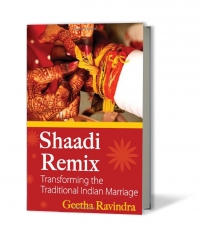Geetha Ravindra Interview – Shaadi Remix – Transforming the Traditional Indian Marriage
“Shaadi Remix – Transforming the Traditional Indian Marriage”
Jasbina Ahluwalia interviews Geetha Ravindra
Geetha Ravindra is an attorney and mediator with over twenty years of experience in the field of Alternative Dispute Resolution. She is currently the mediator for the International Monetary Fund.
Geetha served as Director of the Department of Dispute Resolution Services at the Supreme Court of Virginia and has been an adjunct professor at the University of Richmond School of Law and the College of William and Mary Law School teaching mediation.
Geetha has mediated family cases for over fifteen years and provides assistance to Indian families dealing with difficult marital issues. She also provides communication and conflict resolution training.
_____
(00:48): Hello everyone. Welcome to Intersections Match’s Talk Radio, a monthly holistic lifestyle show focused on the continual evolution into the best versions of our authentic selves.
This is Jasbina, your host. I’m a former practicing lawyer and the Founder of Intersections Match, the only elite national personalized matchmaking company focused on singles of South Asian descent nationwide in the US.
As a dating coach and matchmaker, I’m always interested in fresh perspectives from authors, researchers and experts to help me provide unparalleled service to our clients.
I had the pleasure of reading the book, Shaadi Remix: Transforming the Traditional Indian Marriage by attorney Geetha Ravindra. I thought Geetha would have valuable insights to share with you. Geetha is an author, attorney, mediator and trainer who is currently the mediator for the International Monetary Fund. Geetha has mediated family cases for the Richmond City Juvenile and Domestic Relations District Court for over 15 years. She also provides assistance to Indian families dealing with difficult marital issues. Welcome to the show, Geetha.
Geetha Ravindra
(1:55): Thank you very much, Jasbina. It’s a pleasure.
(1:59): It’s a pleasure to have you on. As an Indian woman who was raised in the US, got married through the arranged marriage system and has been happily married for over 20 years, why do you say in your book, “As the mother of a teenaged daughter and son, I could never imagine suggesting that they marry someone I chose after having met for 10 minutes, as I was expected to?” Tell us about that.
Geetha Ravindra
(2:25): I have now been married for 25 years. I just celebrated my anniversary. I have a 21 year-old and a 17 year-old. You’re absolutely right. I am blessed to have had a very happy and successful marriage, but I met and spoke with my husband 10 minutes before we decided to get engaged. I could not dream of this for my own children.
I think the difference is this. I grew up at a time and in an era where I put enormous trust and confidence in my parents to select my prospective husband. I had a tremendous belief that they would indeed find for me someone who would be a good partner. I went into my marriage without any prior relationships to compare my husband to. I put all of my eggs in that basket. I have committed, since then, my life to my husband.
Today, for the younger generation, it’s different. It’s almost flipped. I believe that younger people today, while they love and trust their parents, the matter of marriage has evolved for us. Instead of the children trusting their parents to find an appropriate match, we’re at a stage where the parents must trust their children to recognize and identify a partner that would be most suitable for them. I don’t believe that the same commitment and trust that we had in that system exists today. It’s not the same.
Many of the divorces that I’ve dealt with involve individuals who live in different continents. These marriages are very challenging because you don’t know enough about the individual that you’re marrying. I’ll talk about women here. I’m not trying to generalize. In many cases, women who marry a man who has a job or is living in the United States come here hoping that they will have a successful marriage.
They often find that they’re not the best person to be married to. They may have other relationships and are not ready for that kind of commitment. But they succumb to pressures by the family to agree to the marriage. Then it falls apart. There have been way too many experiences in the recent decade where these arrangements made by parents with very good intentions have not worked. The responsibility now lies more heavily on the next generation to find a match that is best suited for them.
(5:47): You mentioned that you have so much experience in terms of working with people in marital discord. You state in your book, “Most of the couples I know who have divorced or are in the process of getting divorced had their horoscopes approved as a good match by some astrologer before they got married.” Based on your experience with hundreds of families struggling with marital issues, what do you think about matching horoscopes to ensure compatibility?
Geetha Ravindra
(6:21): I don’t mean any disrespect to astrology or that tradition. I know it’s very important to many families of Hindu faith. With that said, I have found many examples where people are told what they hope they will hear. Sometimes it’s about how much you pay to get the answer you want. There is lack of trust from my perspective in what we’re hearing from astrologers.
There really is a legitimate science there. But how it has been used in terms of marketing in a commercial manner to support marriages where there is something to be gained, I question that. Like many of the other factors that used to be considered, like your family status or caste, astrology is one element that is considered by families in determining compatibility.
A lot of people, even in this country, will look at their horoscope and say, “Oh my God. It’s a good month to do X, to meet someone or begin a job.” It’s part of what people do. I appreciate that there is a need to be able to rely on some objective standard to evaluate compatibility. But what we’ve seen in actual divorces and separations is that you can have these glowing charts that suggest that you’ll have a wonderful life, but there’s clearly a mismatch when they start living together.
(8:10): Given that horoscopes, caste and dowry are no longer relevant in determining compatibility, what types of things do you think people should be considering when looking for a life partner?
Geetha Ravindra
(8:10): That’s a great question. I think those things we historically used to assess compatibility aren’t necessarily as applicable today. I describe what I call “contemporary considerations.” I know that your company is all about helping to support finding that right fit. I think it’s important for us to mentally evaluate some things.
Each person has to think, “What kind of person do I want to marry? What are the things that are important to me?” This is in terms of education, intelligence and spirituality. What are their values? Are they consistent with mine? What is their approach to communication? Is it transparent, open and honest?
The passion or physical attraction fades after a certain period of time. That honeymoon phase is temporary. What you need to know is, “Does this person exhibit the qualities, character and nature that allows me to enjoy companionship with them long term?” Do I trust them? Are they trustworthy? Do we have the same interests? Do we have the same vision of where we want to be in life?
There are a couple of things that are different for Indian families versus American families. I’ve worked with American families as well. For Indian couples, it’s often important to have an open conversation about the role of parents or in-laws. I can’t tell you how many couples have challenges because the mother-in-law is incredibly demanding, her expectations are unreasonable and they’re too hovering or involved.
It becomes very difficult to enjoy a private, independent relationship with your spouse. That’s something that Americans don’t think about as much but it’s a real issue for many Indian couples. I find more issues among Indian couples related to finances. Indian women are very well educated and financially independent, which is one reason I think why we see an increasing number of divorces.
Women no longer have to stay in a marriage where they’re not happy or feeling valued in. The financial conflicts often arise from who is going to be paying for what. What kind of lifestyle do we want to have? Is this our money or your money and my money? These things seem to be almost silly but often cause strife in a marriage. It can leave people feeling really frustrated and angry about misunderstandings. People might feel devalued, minimized or taken advantage of, depending on what’s happening.
(11:48): That is one of the greatest services that your book provides. You offer questions that are worth discussing in terms of assessing compatibility. You mentioned finances. Will you give one or two other examples of questions that you would encourage couples to discuss? Compatibility is important. There are other means to assess it, apart from caste or horoscope.
Geetha Ravindra
(12:31): I think another huge issue is career aspirations. As I mentioned earlier, women are increasingly financially independent and progressing at enormously wonderful rates in their careers. Many travel and have the inability to come home and cook a fresh meal at the end of a long day. I had a very open conversation with my husband.
I said, “I want to work after marriage. How do you feel about that? I’ve spent a lot of time on my education. I want to contribute to society. It’s important to me to have that. It’s not that I don’t want to have a family life, but I also want a career. Is that something that you would be comfortable with?” I think putting that on the table up front is very important. It can hopefully support transparency to avoid any misunderstanding down the road. I’m not going to say that, even with that conversation, there may not be issues down the road. But I think it’s better to put that goal on the table.
One of the other things that has been a challenge in many Indian marriages is the gender imbalance. Many Indians are familiar with our more patriarchal society. Many young women grow up seeing their fathers and uncles enjoying the opportunity to allow their wife to do most of the heavy lifting at home with household duties and raising the children.
Today, people want to have an equal partnership in the marriage. That includes household responsibilities and raising children. Have a discussion up front. Ask, “What is your perspective on how household responsibilities should be shared? Do you feel that we could outsource some duties, like cleaning or going out to dinner? Is that okay? What are your thoughts about that?”
It might seem very trivial but it does lead to conflict and difficult situations where, the wife for instance, might feel overwhelmed and the unfair imbalance in terms of household duties and responsibilities. It’s important to be clear on the front end about expectations, work and goals.
(15:42): That is the day-to-day of life in a marriage. I agree with those questions. Life is full of transitions. Who knows what the future holds? In addition to being on the same page, you need to have that open and honest dialogue to see how you can negotiate the values if they are different. Having differences is fine, but the ability to be respectful in negotiating is the reality of what marriage looks like for people. Having that is invaluable in terms of having open dialogue and setting that precedent.
Geetha Ravindra
(16:45): I love what you’re saying. I think that’s the crux of it. We are not perfect. There is no husband or wife who is truly the perfect person. We all have weaknesses. To expect that, in your husband or wife, you’re going to find someone who is flawless is unrealistic.
The question is, what are the things that are most important to you? What is it that you can negotiate with your partner to work together? Can you resolve differences and find compromises that work for both of you in a positive way? Can you do that effectively? Sometimes, through the courting or dating phase, by going through some experiences that are difficult may enable us to predict how well you deal with problems.
Life is not always rosy. You can see how someone reacts when a mistake is made or something changes. Are they flexible? Are they understanding? Are they open to listening and adapting? How do we manage conflict? I talk a little bit about conflict resolution skills and listening skills because it’s inevitable. We’re human beings.
It’s going to happen, even with the kindest people in the world who have strong self-esteem. Conflict happens. The key is, how do you manage it when it happens? If you have the opportunity to see how you worked through it together, it can be very helpful in predicting what the future might look like when you face bigger stuff down the road.
(18:46): I agree. I think that conflict resolution is one of the essential ingredients in a marriage where both people feel fulfilled.
What are some other essential elements of a successful, happy marriage? This is particularly for first and second generation Indian Americans who have been raised both in Indian and American culture.
Geetha Ravindra
(19:20): There clearly has to be good communication. I do a lot of dispute resolution in my day job. Good conflict resolution and communication skills are essential. It’s not just the speaking, it’s the listening. You’ve probably read Dr. Gottman’s research. He can listen to a conversation for three minutes and tell whether a marriage will fail or succeed. He’s listening for how people engage.
If he hears language that suggests contempt where people are insulting towards each other and rejecting, minimizing or belittling, that’s scary and will not lead to a good end result. They say you should have five good interactions to one negative interaction in your conversation with someone in a good relationship. One very important element is good communication and listening skills.
You should also try to respect the other person. It’s almost the golden rule of do unto others. If you come into your relationship knowing that, not only do you love this person, but you respect them and value them as a person, that’s enormously important. Trust and commitment are essential elements.
Most couples will note that if there are some concerns about these things, they will be evident early on in a relationship. If you have any questions about that, you should really pay attention to it early on and not hope that it goes away. In a good relationship, you have a friendship. You have a sincere shared life goal.
When you have the ability to work together towards spending a life together that allows you to achieve your mutual goals, that’s a really positive relationship. If you share those dreams and plans, and understand where your partner is coming from, and engage in mutual support, I think that’s as important as the intimacy that a couple should enjoy. Sometimes that initial passion fades. When real life and responsibilities set in, you have to look deeper into the other person and what you share in terms of interests, goals and values in life. That’s what helps support lengthy marriages.
The sad thing is that a lot of the marriages that are breaking up are not within the first two years, although that is common. I’ve seen an increase in divorces in Indian couples who have been married over 25 years. The only thing that kept them together was their children and their fear or anxiety of the stigma associated with divorce. The straw that breaks the camel’s back is that they recognize, “When I realized I can no longer smile and I am no longer happy, I knew I had to get out of this relationship.” It wasn’t worth it to engage in what has been called an “invisible divorce.” They pretend to be married but they’re really not married.
(23:25): They’re living parallel lives, and separate lives. You mentioned a breakdown in communication, finances and interference by family as some of the issues that you’ve seen that might be a bit more exaggerated in an Indian marriage. Are there any other prevalent problems among Indians that you’ve seen?
Geetha Ravindra
(24:01): Those are the big ones. Interestingly, I have been a bit concerned with the younger couples that are divorcing and the lack of shared commitment. There is almost a greater willingness today, than in decades earlier, to walk away. Marriage is hard, hard work. It’s not magic. There is nothing that will be perfect. It requires attention, nurturing and mutual commitment.
What I’m finding now is, after the first few months when one or both feel, “I don’t like this about this person. This is not working for me,” they are more likely to just walk away and give up. I take it as a sign that we’re adopting some of the Western mentality of, “I don’t have to put up with this because I don’t need you to support me.”
Oftentimes, for women in earlier generations, they had to stay married because that was their form of financial stability. They didn’t have the ability to return home or get a job, but today, women can. One of the reasons that I wrote the book because I hope that we can continue to preserve the value of marriage. I think it’s a very important institution in society. We need to give it a little bit more time, attention, patience and support, and make better informed decisions in the front end. It’s not greater than Americans, but I see increasingly among Indian couples less of a willingness to work on the marriage.
Again, I’m not sure why. Maybe it will continue to evolve. Our divorce rate is growing. We had a 1% divorce rate. We don’t really track this effectively in any way. It’s growing. Because it is become an acceptable thing, my worry is that we won’t take the time and care that we ought to in supporting and engendering strong, personal relationships with our spouses when we do get married.
(26:46): The model that I use with matchmaking is a blend of the three Cs. They are what I perceive as the best of East and West culture. There is the compass. This means to be guided by your values and vision for your life’s goals in terms of who you decide to date and partner up with it. There is compatibility.
This is based on many of the things you mentioned. You want to connect on the fundamental values and life goals. It’s a decision more so than the feeling. I think that allowing compatibility to evolve over time is more of a Western concept. Commitment is rooted in the East. I think it is one of the greatest contributions of the East.
Your book also states, “Most of the first marriages that end in divorce are arranged marriages and the successful second marriages are love marriages that are not restricted by caste, language, dowry or other factors.” Will you elaborate on that a bit?
Geetha Ravindra
(28:22): What I’m finding with second marriages is that the individuals are now more keenly aware of what happened in their first marriage that didn’t work, whether it was their own contribution or something about the other person’s behavior that was difficult for them to manage. They get a much clearer sense of priority, which is what some of the questions in my book try to help people think about.
What is important to you when you’re weighing who a compatible person would be? Why the second marriages are working is because I think there is a greater sense of self. Who am I? What’s important to me? What am I looking for in a companion? To me, your spouse should be your best friend, not just your lover and soulmate. Who embodies that?
What are the characteristics that embody that for me? When they’re looking for their second partner, they’re much more attuned to that. They may be able to identify what’s important to them more clearly than in the first instance. They’re not choosing a mate to please their parents or someone else.
They’re thinking, “What are my needs? What are my dreams? What do I require? Are there qualities that I know I can’t tolerate?” These could be things like a quick temper, dishonesty, stubbornness or sexual infidelity. You’re much more aware of that. Then you can think, “What does my ideal person look like?” I think that’s why I feel that second marriages that I’ve seen are more successful.
It’s because you have a greater sense of self-awareness and what you want in a partner. One of my goals in writing the book is, you don’t have to land in divorce or separation. As you’re thinking about marriage, you can reflect more consciously and proactively and say, “What’s important to me and my life, so that when I make these important decisions, I do it fully informed and not reacting.”
(30:56): You proactively let the self-reflection be the grounding for those choices that you’re making. I want to quote one of my favorite passages in your book. It’s a refrain that I know my clients hear from me. This is with respect to avoiding that pitfall of preconceived notions based on whether a man or a woman is a first or second generation Indian. This is one of the things that I speak to often.
These are not my words. These are your words. I want to share it with our listeners. “Amazingly, my husband is more open-minded and liberal than many men born and raised in the United States. From my own experience, I believe that making broad generalizations about Indian men is unfair. One must get to know a person before judging him or her.
If being treated with respect, having equal voice and balance in a relationship and financial independence are important to a woman, she should explore these issues with the men she meets and not assume all Indian men are the same. Stereotypes of Indian women are equally commonplace and also contribute to a young Indian woman’s trepidation regarding marriage.”
I find that very profound. I’m wondering if you can expand on that or share an example from your experience or the hundreds of families you’ve worked with struggling with marital discord, where misplaced stereotypes might have been one of the factors.
Geetha Ravindra
(32:59): In my own marriage, as I mentioned earlier, I met my husband for literally 10 minutes before we were engaged. I don’t know if you’ve read the book Blink by Malcolm Gladwell. I think it was that. There was something inside me that gave me the impression that this was a person I could trust and was genuine and authentic. I could ask these questions and trust the responses that I was getting.
Living in America was very important to me. I was not going to live in India. I was not going to be in an extended family setup. I wanted to have that autonomy. I made that clear. I was also clear about wanting to work. That was important front end discussion in that short conversation. In my own life, I don’t know anyone who could be as supportive of my career aspirations as my husband.
I self-published the book I wrote and he encouraged me to write it. He basically published it for me because he knew it was important for me to share the themes that I had learned from working with families. I work, as you said, with the IMF. I work in Washington, DC but my husband and children are in Richmond, Virginia.
When I got this opportunity to work for the IMF, which is a fabulous opportunity, he was the first one to say, “You need to do this, because this is so great for your career.” I have two lives, in a way. I work during the week away from home. Then I come back on weekends and enjoy being with my family. Those are just a couple of examples of how, in our lives, I have found that the mutual support and respect that we have for each other as human beings has really helped us lead fulfilling lives.
I’m not in any way going to be Pollyanna and say that we have a perfect marriage. Like all marriages, we have different styles of communication. As I said, it’s hard work, so you work at it. That commitment is so vital. We didn’t walk into our marriage thinking, “If I’m not happy, I will walk out.”
If something’s not working, let’s figure out what’s not working. Let’s talk about it. Let’s deal with it. Let’s see if we can find some solutions. That approach is what I mean when I say that he is very liberal and open-minded. I have not felt at all limited by him being raised in India when I was raised in America.
(35:59): We work with first and second generation Indians. Given mindset, traits, qualities or ways of seeing the world are things that you can’t judge based on whether one is first or second generation. They span both. You can find an alignment there regardless of which generation we’re talking about. Your experiences in that regard speak to that.
I appreciate you sharing your insights with us, Geetha. I’m wondering if there is any last thought or take-home message that you’d like to leave our listeners with.
Geetha Ravindra
(36:54): Marriage is not hopeless. I know we’ve been talking about marriages that aren’t successful a little bit. My book does focus a lot on marriages that have not worked but I don’t want in any way to suggest that there is not still an incredibly small divorce rate for Indian marriages. I think that it’s still the lowest in the world. I truly believe that people who love each other, who share dreams, interests and values can have the best marriage possible.
The key is that they have those important conversations. This is the most important decision, in my mind, that you’ll ever make in your life, who your partner is. The kind of time, energy and effort that we put into other things like education and our job, we must invest in selecting a good partner and in our marriage once we are in a relationship.
I want, hope and pray that your listeners who are hoping to find a relationship believe that they can have a very fulfilling, lasting and happy marriage. Think through the qualities and characters that you are looking for in a mate can help support making that best decision for your future.
(38:32): I completely agree. Thank you so much for joining us and sharing your insights, Geetha. It’s been a pleasure.
Geetha Ravindra
(38:39): It’s been a pleasure speaking with you, Jasbina. Thank you so much for having me.
(38:45): In case you joined us late and you want to share this show with people in your life, I’d like to remind you that today’s radio show will be archived and available as a podcast on Intersections Match’s website, which is www.IntersectionsMatch.com. I can be reached at jasbina@intersectionsmatch.com. I appreciate you hanging out with us. Make sure to join us for next month’s show. Take care, everyone.
_____
What do you think?
Would you like to add to the insights shared in the Geetha Ravindra? Share your thoughts in the comments below.
_____





